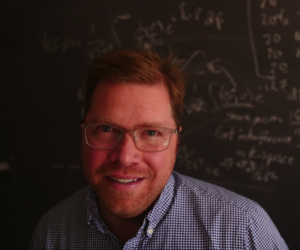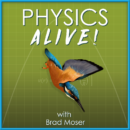The Physics Alive Podcast

Episode #29
Fluency Bias and Deliberate Practice with Louis Deslauriers
This is part 2 of an interview with Louis Deslauriers, the Director of Science Teaching and Learning and Senior Preceptor in Physics at Harvard University. We discuss two recent publications from his research group. In the first, he finds that students can actually feel like they are learning more while passively listening to a polished lecture than engaging in active learning. We’ll talk about that finding and what that means. In the second, we dive into his latest work on deliberate practice, and how we might take the gains from active learning in the classroom and boost them up even more by transforming homework.
Today's Guest:
Louis Deslauriers
Learn more about Louis Deslauriers and his work:
Short bio: Louis Deslauriers is the Director of Science Teaching and Learning and Senior Preceptor in Physics at Harvard University. He completed his M.S.E. in Electrical Engineering (2000), M.Sc. in Physics (2001), and his Ph.D. in Applied Physics (2006), at The University of Michigan. His postdoctoral work in Atomic Interferometry was conducted at Stanford University from 2006 to 2008. In 2008 Louis Deslauriers decided to satisfy his curiosity about physics education research and as such took a position of researcher with the Carl Wieman Science Education Initiative at the University of British Columbia in Vancouver, BC as a Science Teaching & Learning Fellow. At UBC he has worked on course transformation and assessment in modern physics, quantum mechanics, and other topics. In 2011, “Improved Learning in a Large-Enrollment Physics Class” (Deslauriers, Schelew, Weiman) was published in Science.
Episode Notes and Resources
Articles mentioned in Part 1 and Part 2 of this interview:
- Improved learning in a large-enrollment physics class
- Learning and retention of quantum concepts with different teaching methods
- Use of research-based instruction strategies: How to avoid faculty quitting
- Measuring actual learning versus feel of learning in response to being actively engaged in the classroom
- Increasing the effectiveness of active learning using deliberate practice: A homework transformation
Quotes:
- If students learn [how to solve the Schrodinger equation] as a set of procedures, then they might as well be a set of phone numbers. The research from cognitive psychology is very clear: factual information gets lost within a few weeks; it’s gone. But students that code information conceptually…that is a lot more robust over time.
- We know that researched based instructional strategies work. How do we keep it up? What are the key supports to ongoing implementation? The number one thing is proper faculty training. And the next is a supportive departmental environment.
- Give students time and space to think. If you do that, learning will improve.
- Students are not biased against active learning; they are instead biased in favor of perceived fluency.
Strenuous cognitive effort is inherently dis-fluent.
